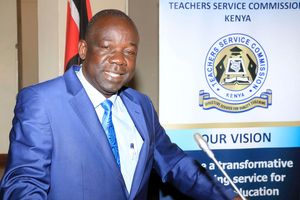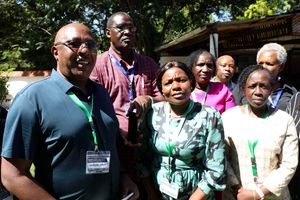
Students in class in this picture taken on August 28, 2024.
A funding crisis in the education sector has deepened after a parliamentary committee recommended an extra Sh8.8 billion budget cuts from critical areas.
The Education committee of the National Assembly proposes to reduce capitation funds for secondary, junior and primary schools.
Committee chairman Tinderet MP Julius Melly made the proposals on the education sector’s budget for the 2025/26 financial year to the Budget and Appropriations Committee (BAC).
He, however, warned that the resource challenges affecting the sector may affect the quality of education in the country.
“The resource challenge is an indication that learners at various levels are not adequately funded as expected based on existing policies on funding. This may in the long run affect the quality of education delivered in our learning institutions hence negatively affecting education outcomes,” said Mr Melly.
The committee is also pushing for Sh30 billion to finance critical areas in the Ministry that have no budgetary allocations in the next fiscal period.
The documents presented to BAC, chaired by Alego Usonga MP Samuel Atandi, shows that the committee wants the billions earmarked for secondary, junior and primary schools’ capitation funds slashed by Sh5.9 billion towards the financing of examination and invigilation that had not been budgeted for.
The reductions include Sh3 billion from the secondary school capitation kitty, Sh2 billion from junior school capitation and Sh900 million from primary school capitation in what will strain the public schools as it affects uptake of education by learners from poor backgrounds.
University Education for government sponsored students in private universities is losing Sh1.3 billion due to lack of information from the State Department for Higher Education on the number of the government sponsored students in the private universities.
This is despite the Education committee noting that allocation to student centered areas- capitation, loans and scholarships- are not adequately funded.
“The critical resource gaps in the sector need to be addressed to ensure that the various reforms envisaged in the sector are realized and the gains made towards education for all are not eroded,” Mr Melly noted.
In the 2025/26 fiscal period, the Education sector which includes State Departments for Basic Education, Higher Education, Technical Vocational Education and Training (TVETs), Science, Innovation and Research (SIR) and the Teachers Service Commission (TSC) has been allocated Sh702 billion.
The allocation is the biggest of the proposed Sh4.2 trillion budget.
Of the billions allocated to the education sector, TSC takes a huge chunk with Sh387.7 billion going towards remuneration of teachers in the public secondary and primary schools, Sh144.7 billion towards Higher Education, Sh126.1 billion for basic education, Sh42 billion for TVETs and Sh943 million for SIR.
The Education Committee further decried the lack of funding in critical areas as it pushes for Sh17 billion under University Education to support 208,000 students expected to join various universities later in the year as well as Sh7.3 billion for the conversion of 20,000 intern teachers on permanent terms.
“This is to ensure the current intern teachers are absorbed once the internship comes to an end later in the year,” says Mr Melly.
Also required is the Sh3.7 billion through the National Government-Constituency Development Fund (NG-CDF) to be provided as a matching fund to support school infrastructure improvement in public facilities and Sh1.9 billion towards recruitment of 2,000 TVET instructors so as to bridge the current TVET instructor gap which stands at 6,000.
Despite the budget cuts, Mr Melly raised concerns that the State Department for TVET has introduced new exchequer funded capital projects despite the fact that some ongoing projects have not been completely funded.
“Information on the newly introduced capital projects is scanty especially in the feasibility, a key aspect in project conceptualization. This is against the guidelines provided for resource allocation to capital projects,” says Mr Melly.
The committee is also concerned that the allocation of Sh664 million for the construction of TVET institutions under the Bottom-Up Economic Transformation Agenda (Beta), “is relatively huge given that only 17 TTIs are being funded.”
The committee is also concerned that despite the investments which the government is undertaking at the TVET subsector, especially on infrastructure and the equipping of institutions, the State Department is unable to undertake monitoring and evaluation.
“This exposes the institutions to risks such as malpractices and financial mismanagement.”








